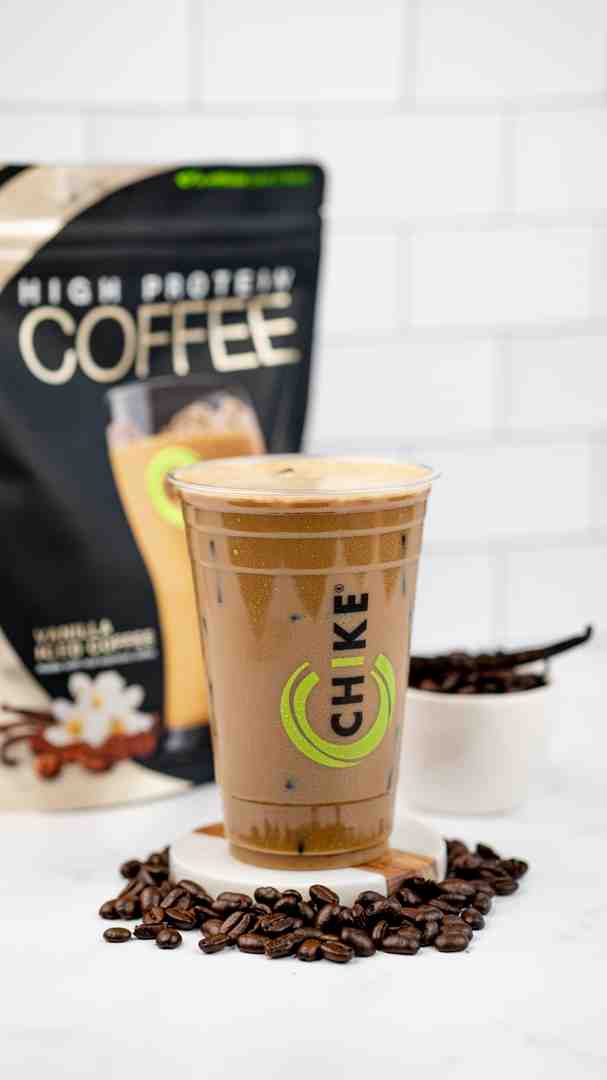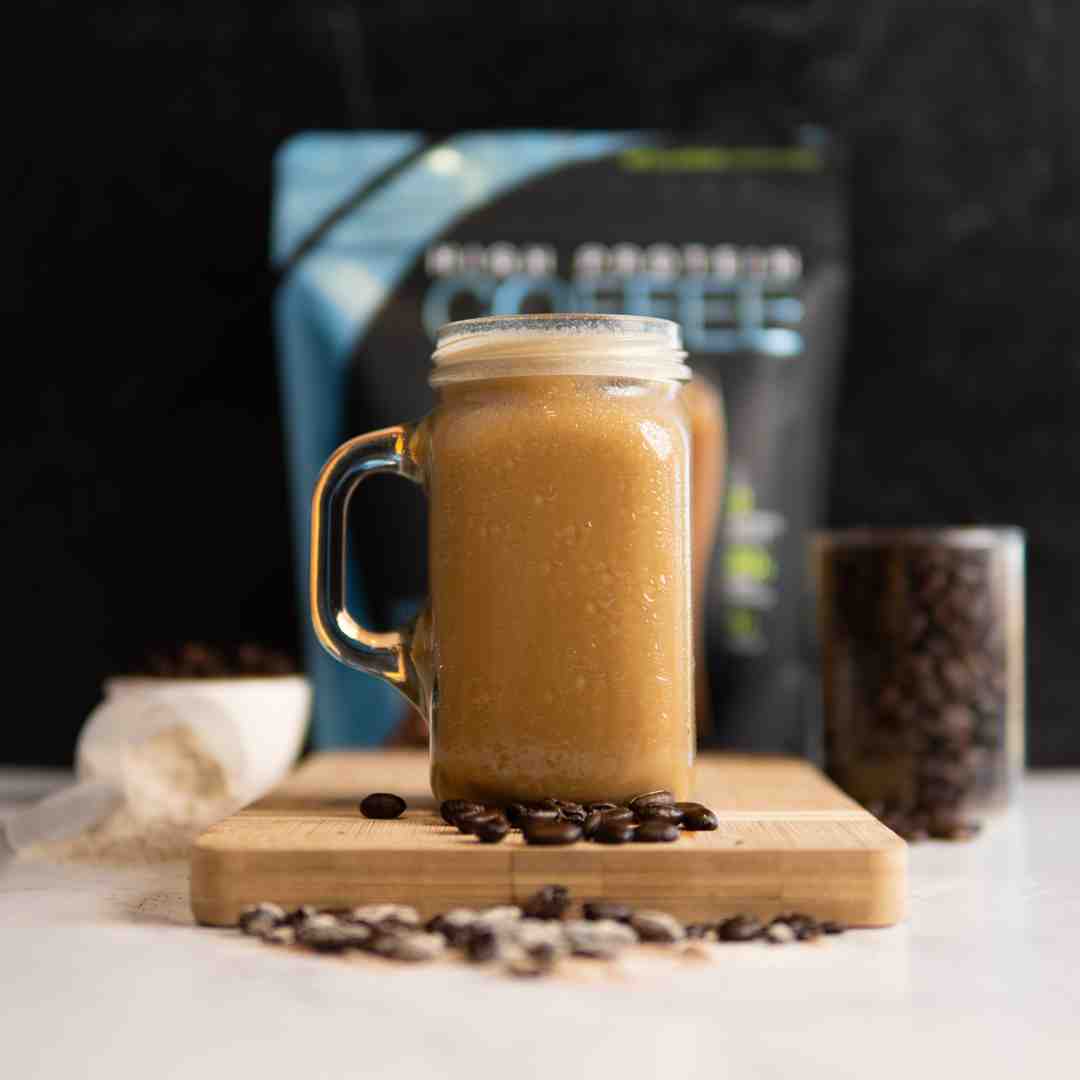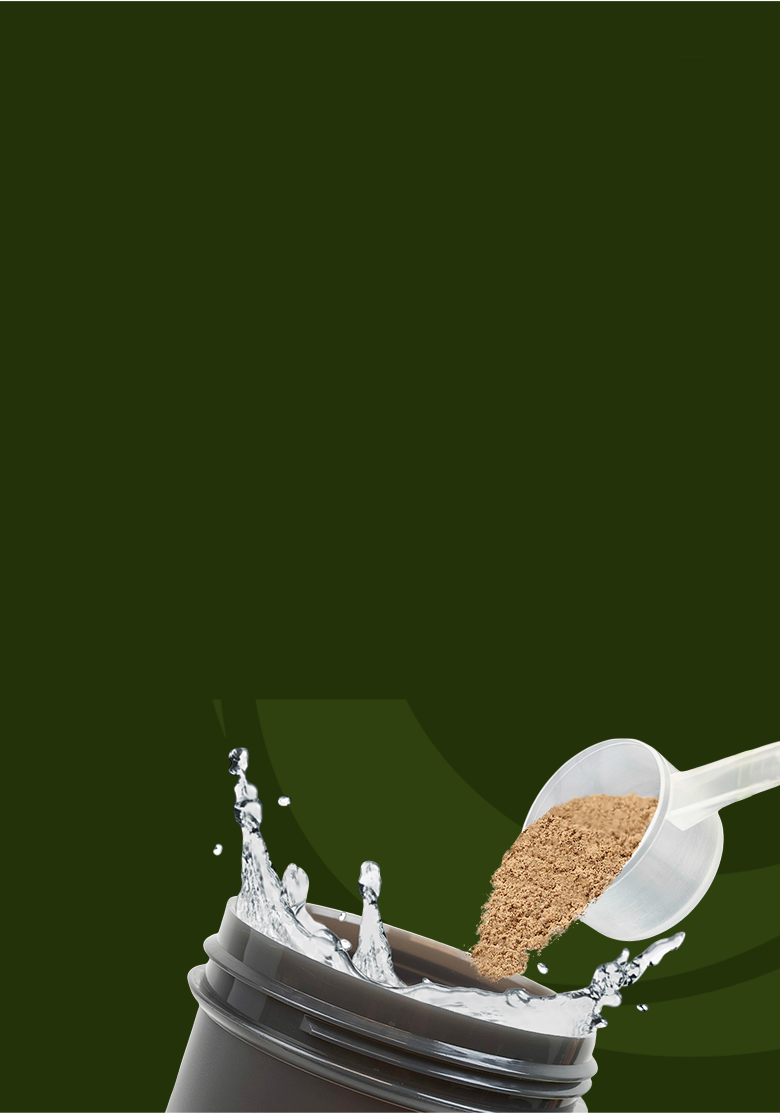The Perfect Blend: Coffee with Protein Power
Protein coffee (sometimes called "proffee") combines brewed coffee or espresso with protein powder to create a nutritious, energizing beverage that delivers both caffeine and protein in one convenient cup.
What is protein coffee?
- A blend of coffee with 10-20g of protein powder
- Can be made hot or iced
- Typically contains 100-150mg of caffeine per serving
- Zero to low sugar options available
- Can replace a traditional breakfast or serve as pre/post-workout fuel
Protein coffee isn't just another social media trend—it's a practical solution for busy professionals and fitness enthusiasts looking to boost their protein intake while enjoying their daily caffeine fix. This two-in-one beverage helps you start your day with sustained energy, supports muscle recovery, and can even help manage hunger throughout the morning.
The concept is simple but brilliant: take your favorite coffee and add a scoop of protein powder. The result? A creamy, satisfying drink that delivers the alertness of caffeine alongside the staying power of protein—without the sugar crash that comes from traditional coffee shop beverages.
So, I'm Mac Mascorro, https://www.linkedin.com/in/macmascorro/. As a health and wellness brand executive who has been experimenting with protein coffee for over five years, I have worked on helping brands develop clean, delicious options that support active lifestyles. My expertise in protein coffee comes from working with teams doing extensive product testing and formulation work in the functional beverage space.
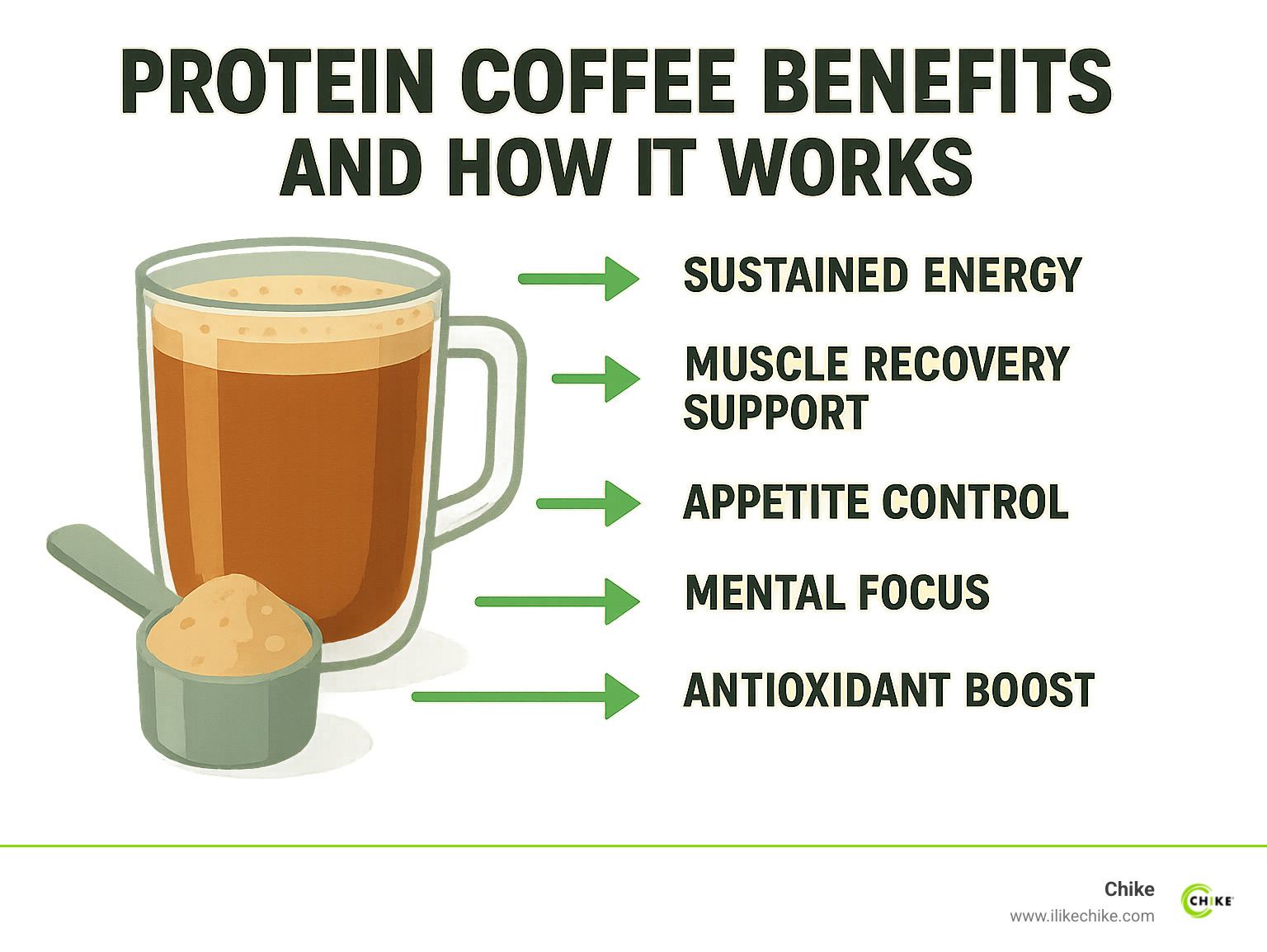
What Is Protein Coffee (Proffee)?
Ever wondered where that catchy term "proffee" came from? It burst onto the scene in the early 2020s as social media shorthand for protein coffee, quickly becoming a viral sensation on TikTok and Instagram. But this isn't just another fleeting internet trend—it's a genuinely useful nutrition hack that's here to stay.
At its heart, protein coffee is beautifully simple—just your favorite brewed coffee or espresso combined with protein powder or a ready-made protein drink. While your regular black coffee contains a measly 0.21 grams of protein per 6 oz cup (and even a milk-based latte only offers about 4.41 grams), adding protein powder transforms your morning ritual into a nutritional powerhouse with 20+ grams of protein per serving.
The beauty of this combination lies in how caffeine and protein complement each other perfectly. Your coffee delivers that immediate mental clarity and energy boost you crave, while protein provides lasting fullness and supports your muscles. Together, they help you avoid that dreaded mid-morning crash that often follows coffee paired with sugary breakfast foods.
Unlike your standard latte that gets a modest protein boost from milk, protein coffee delivers a significant amount of protein that actually makes a difference in your daily nutrition goals. This makes it especially valuable if you're following a high-protein diet or struggling to hit your protein targets throughout the day.
According to scientific research on caffeine metabolism, caffeine typically peaks in your bloodstream within 30-60 minutes and has a half-life of about 5-6 hours in healthy adults. When you pair this with protein's slower digestion rate, you get a more balanced, sustained energy release that carries you through your morning.
How Much Protein Can You Add to Protein Coffee?
The ideal amount of protein for your coffee depends on a few factors: the type of protein powder you're using, your personal taste preferences, and how much liquid you're working with. Most protein coffee enthusiasts add between 10-30 grams per serving, which typically means 1-2 scoops of powder.
For the best taste and texture, start with a single scoop (usually providing 15-20 grams of actual protein) and adjust from there based on your needs and preferences. Adding too much can leave you with a chalky drink that masks the coffee flavor you love.
Worried about clumping? Here's how to keep your protein coffee smooth and delicious:
For hot coffee: Create a smooth paste with your protein powder and a small amount of cool liquid first, then gradually add your hot coffee while stirring.
For iced versions: Use a blender or shaker bottle to combine your protein and cold coffee for about 20-30 seconds until everything's fully mixed.
A handheld frother can be your best friend for quickly breaking up any stubborn clumps in either hot or cold versions.
That different proteins mix differently—whey isolate and collagen typically dissolve more easily than plant-based options, which might need a bit more blending effort.
Does Hot Coffee Damage Protein?
Many coffee lovers worry that hot coffee might damage their protein powder, potentially reducing its benefits. The truth depends on which protein you're using.
Whey protein starts to change its structure (denature) at temperatures above 150°F (66°C), while typical coffee is brewed around 200°F (93°C). But here's the good news—denaturation primarily affects the protein's structure, not its nutritional value. You might notice changes in texture or mixability, but you'll still get those amino acids your body needs.
Collagen protein is even more heat-resistant, remaining stable up to approximately 700°F (371°C), making it an excellent choice for hot protein coffee. It dissolves beautifully in hot liquids without clumping or losing nutritional benefits.
If you're still concerned about preserving your protein's structure, you have options:
Let your hot coffee cool for a minute or two before adding protein Try using room temperature coffee or cold brew Choose heat-stable proteins like collagen for hot applications Mix your protein with milk or creamer first, then add coffee
The bottom line? While extreme heat can affect certain protein structures, your morning coffee isn't hot enough to significantly impact the nutritional benefits of your protein coffee. So go ahead and enjoy this perfect pairing without worry!
Proven Benefits of Drinking Protein Coffee

Your morning cup of joe can do so much more when you add a protein boost. Let's explore the science-backed advantages that make protein coffee more than just a trendy beverage—it's a powerhouse of nutrition that supports your overall wellbeing.
Improved Satiety and Appetite Control
Ever notice how a plain coffee might leave you hungry an hour later? That's where protein makes all the difference. Protein is your best friend when it comes to feeling full and satisfied. According to scientific research on protein satiety, protein directly influences your hunger hormones like ghrelin (which makes you hungry) and GLP-1 (which signals fullness).
The numbers speak for themselves—participants who doubled their protein intake naturally consumed about 500 fewer calories daily without even trying. By starting your day with protein coffee, you're setting yourself up for better appetite control that lasts well into the afternoon.
Improved Muscle Recovery and Maintenance
For the gym-goers and active folks among us, protein coffee delivers those essential amino acids your muscles crave after a workout. Think of it as recovery in a cup—providing 15-20 grams of protein that helps repair and build muscle tissue when your body needs it most.
The convenience factor is huge here. Instead of juggling a coffee in one hand and a protein shake in the other, you get both in one delicious package. This makes it perfect for busy mornings when nutrition might otherwise take a backseat to convenience.
Weight Management Support
The caffeine-protein duo creates a perfect storm for healthy weight management. Caffeine gives your metabolism a gentle nudge while protein requires more energy to digest than carbs or fats—a phenomenon called the thermic effect of food.
Meanwhile, that protein-induced fullness naturally helps you eat less throughout the day. And perhaps most importantly, adequate protein intake helps preserve your lean muscle mass during weight loss, ensuring that what you're losing is primarily fat, not muscle.
Improved Mental Alertness and Cognitive Function
We all know coffee helps us feel more alert (thank you, caffeine!), but adding protein takes these benefits to the next level. While caffeine blocks those sleepy adenosine receptors, protein provides amino acids that help create important brain chemicals.
Together, they help stabilize your blood sugar levels, preventing those mid-morning energy crashes that have you reaching for a donut. The long-term benefits are impressive too—regular coffee drinkers have up to 60% lower risk of developing conditions like Alzheimer's and Parkinson's disease.
Antioxidant and Anti-inflammatory Properties
Here's something surprising: coffee is actually one of the richest sources of antioxidants in the American diet. These powerful compounds help protect your cells from damage and fight inflammation.
When you add protein (especially whey protein), you're introducing additional antioxidant compounds like lactoferrin and immunoglobulins. It's like creating a super-beverage that fights oxidative stress from multiple angles.
Heart Health and Metabolic Benefits
Your heart loves the combination in protein coffee too. Moderate coffee consumption has been linked to improved heart health markers, while protein helps maintain healthy blood pressure and cholesterol levels.
Together, they support healthy blood vessels, help maintain normal blood pressure, improve cholesterol profiles, and reduce inflammation throughout your body. These benefits may lower your risk of developing metabolic syndrome—a cluster of conditions that increase your risk of heart disease, stroke, and type 2 diabetes.
By making protein coffee part of your daily routine, you're not just satisfying your caffeine craving—you're making a smart choice that supports your body in multiple ways. The simple act of adding protein to your coffee transforms an ordinary beverage into a nutritional powerhouse that energizes your day and supports your long-term health goals.
Choosing the Right Protein Powder for Your Cup

Finding your perfect match for protein coffee can transform your morning ritual from ordinary to extraordinary. Think of it as finding the right dance partner for your coffee—some proteins blend in seamlessly while others might step on your taste buds' toes. Let me guide you through the options:
Whey Protein Isolate is often considered the gold standard for protein coffee enthusiasts. It's like that friend who gets along with everyone—it dissolves beautifully, offers a complete amino acid profile, and typically brings a neutral flavor to the party (especially unflavored varieties). If you're sipping post-workout, whey isolate is particularly effective at kickstarting muscle recovery. Even those with mild lactose sensitivities can often enjoy it since the isolation process removes most of the lactose and fat.
Collagen Peptides have become the darling of the hot coffee world, and for good reason. They're the chameleon of proteins—virtually tasteless and they disappear into hot liquids without a trace. Unlike some proteins that throw a fit in heat, collagen stays calm and collected even in piping hot coffee. While it's not a complete protein (missing some essential amino acids), it brings unique benefits for skin elasticity, joint health, and hair strength. If silky smooth hot protein coffee is your goal, collagen might be your new best friend.
Plant-Based Protein Blends open the door for everyone to enjoy protein coffee, regardless of dietary preferences. Modern blends combine multiple plant sources to ensure you're getting all essential amino acids. They're like a well-rounded team where each player brings something special—pea protein offers excellent digestibility, brown rice adds texture, and hemp brings along healthy fats. As a bonus, many plant proteins deliver extra fiber and micronutrients, along with the satisfaction of making an environmentally-friendly choice.
Hemp & Pea Proteins deserve special recognition in the plant world. Hemp protein brings a subtle nutty flavor that can actually improve your coffee experience, along with beneficial omega-3 fatty acids. Pea protein, meanwhile, is the overachiever of plant proteins—highly digestible and containing all essential amino acids. Both options let you enjoy your protein coffee while knowing you've made a sustainable choice.
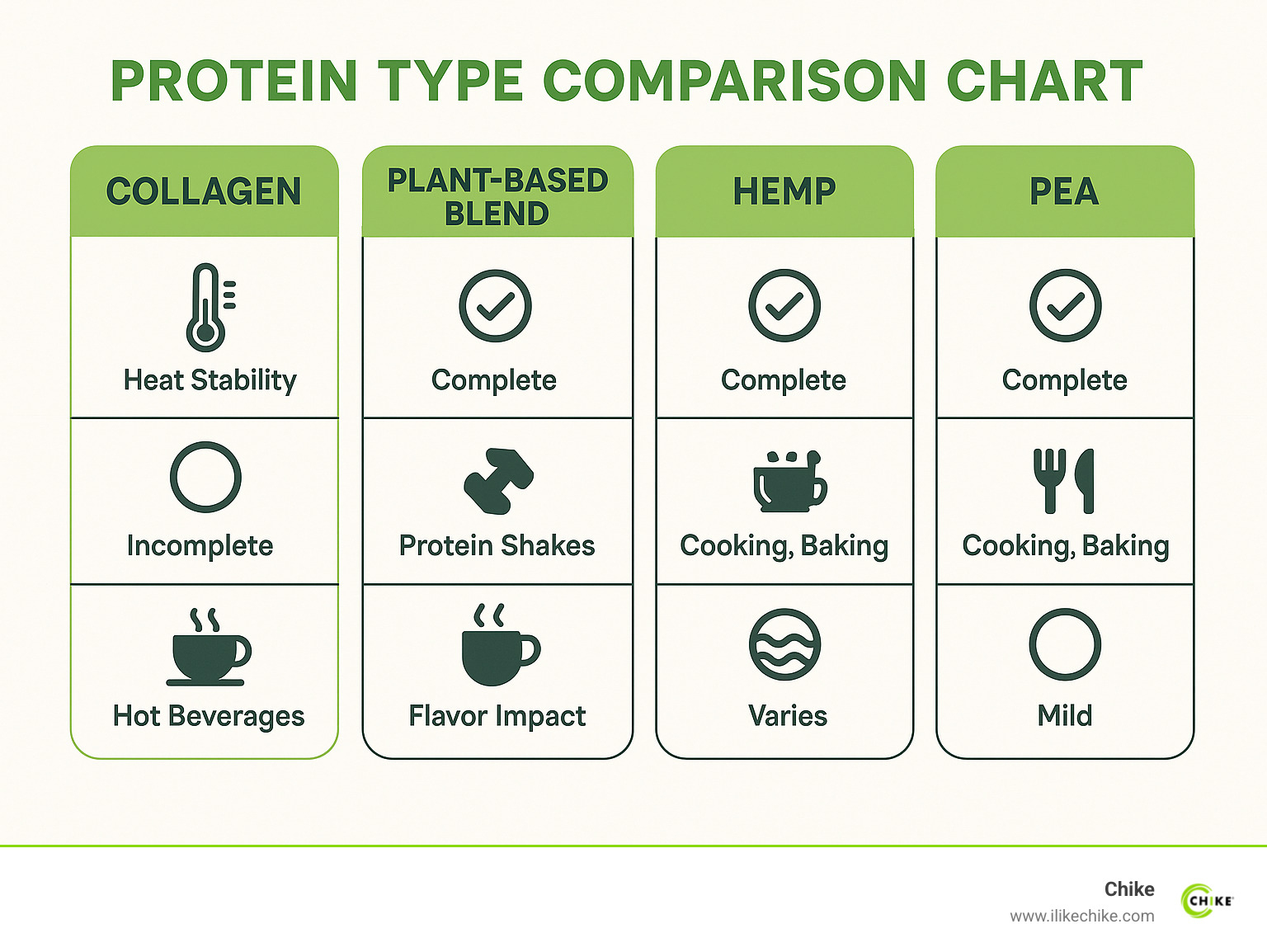
When shopping for your perfect protein powder, become a label detective. Check the sugar content—less is generally better unless you're looking for specific training fuel. Consider flavor compatibility—vanilla, chocolate, and unflavored varieties typically play nicest with coffee. Be mindful of allergens if you have sensitivities, scan for unnecessary additives, and if environmental impact matters to you, research the sustainability practices of your protein source.
Protein Coffee & Vegan or Dairy-Free Diets
Creating a delicious cup of protein coffee is absolutely achievable for those following plant-based lifestyles—it just requires knowing which ingredients will deliver both great taste and texture.
The plant protein landscape offers plenty of options for your morning brew. Pea protein isolate tends to be the crowd-pleaser with its neutral flavor profile and impressive solubility. Hemp protein brings a pleasant earthiness that many coffee lovers actually prefer, creating a nutty dimension similar to certain coffee origins. While brown rice protein won't break the bank, be warned—it can sometimes bring a sandier texture to your cup. For the best experience, look for proteins specifically labeled for beverages, as they're formulated with solubility in mind.
Your choice of milk alternative can lift your vegan protein coffee from good to great. Oat milk has become a barista favorite for good reason—it creates that luxurious, creamy mouthfeel that makes coffee shop drinks so satisfying. Almond milk offers a lighter option if you're watching calories, while coconut milk adds tropical richness and healthy fats. Soy milk pulls double duty by contributing additional protein to your morning ritual. Many plant milk companies now offer protein-fortified versions, allowing you to sneak in even more nutrition with every sip.
If gluten is a concern, you'll be relieved to know that coffee and most protein powders are naturally gluten-free. However, manufacturing cross-contamination can occur, and some plant protein blends might include gluten-containing grains. If you have celiac disease or gluten sensitivity, look for the certified gluten-free label for peace of mind.
Flavor Boosters & Add-Ins for Protein Coffee
Let's transform your protein coffee from "pretty good" to "can't live without it" with some thoughtful additions that improve both flavor and function.
Natural flavor improvers can take your brew to new heights without artificial ingredients. A dash of cinnamon adds warmth and complexity while potentially helping stabilize blood sugar levels—win-win! A teaspoon of unsweetened cocoa powder creates a delightful mocha experience while adding antioxidants to your cup. A few drops of vanilla extract complement coffee's natural flavor profile beautifully, creating harmony in your mug. And when fall comes calling, nutmeg or pumpkin spice can transform your protein coffee into a seasonal treat without the sugar overload of coffee shop alternatives.
For those looking to boost nutrition even further, functional add-ins offer exciting possibilities. MCT oil provides sustained energy and supports ketone production for those following keto lifestyles. A spoonful of nut butter creates incredible creaminess while adding heart-healthy fats. Maca powder brings adaptogenic properties that may help with energy and hormonal balance. For an anti-inflammatory boost, try a pinch of turmeric with black pepper (the pepper improves turmeric absorption).
Get creative with your ice cubes when making cold protein coffee! Coffee ice cubes prevent dilution as they melt, maintaining your drink's flavor integrity. Frozen milk cubes (dairy or plant-based) add progressive creaminess as you sip. You can even make protein-infused ice cubes by freezing a diluted protein shake, allowing you to boost protein content while keeping your drink perfectly chilled.
For inspiration, check out the Skinny Vanilla Protein Latte recipe that combines vanilla protein with espresso for a coffee-shop quality experience with added nutrition benefits. It's proof that healthy choices can still feel like treats!
How to Make Protein Coffee at Home
Whipping up a delicious protein coffee at home doesn't require barista-level skills—just a few simple tools and techniques. Let's break down everything you need to create your perfect morning boost:
Essential Equipment Your protein coffee toolkit doesn't need to be fancy. The basics include your favorite coffee maker or espresso machine, something to mix with (like a blender bottle, handheld frother, or blender), a measuring scoop for your protein powder, and either an insulated cup for hot versions or a tall glass for iced creations.
The beauty of protein coffee is its flexibility—you can go hot or iced depending on your mood and the season.
For a hot protein coffee, simply brew your coffee as usual, let it cool slightly (to around 160°F—hot but not scalding), then add your protein powder using one of the mixing techniques I'll share below. Finish with any flavor boosters or milk you enjoy.
If you're craving something refreshing, the iced method works beautifully. Brew and completely cool your coffee (or use cold brew for a smoother taste), combine it with protein powder and ice in a blender or shaker, mix until smooth, and pour into a glass with your favorite toppings.
Mixing Magic: Say Goodbye to Clumps
Nobody wants to sip on a lumpy protein coffee. Here are my tried-and-true techniques for silky smooth results:
The Blender Bottle Method works wonders—just add your protein powder and coffee to a blender bottle with that little metal whisk ball and shake vigorously for about 30 seconds. The ball breaks up clumps while you get a mini arm workout!
If you have a handheld milk frother, you're in luck. Add protein powder to your cup, pour in just a splash of coffee, and mix with the frother until smooth. Then add the remaining coffee for clump-free perfection.
For the ultimate smooth texture, nothing beats a blender. Combine all ingredients and pulse for 15-30 seconds until completely smooth and slightly frothy.
My personal favorite is the Paste Method—create a smooth paste with protein powder and a small amount of liquid before adding the rest of your coffee. This prevents those annoying dry pockets of powder.
For specific mixing instructions custom to Chike products, check out What's the Best Way to Mix Chike Powders?
Bulletproof-Style Protein Coffee
Want to take your protein coffee to the next level? Try this bulletproof-style approach for an indulgently creamy, energy-packed cup:
Brew your favorite hot coffee, then add it to a blender with protein powder, a tablespoon of MCT oil, and optionally a tablespoon of grass-fed butter. Blend for about 30 seconds until it's frothy and beautifully emulsified, then serve immediately in an insulated mug to keep it warm.
This version creates a luxurious latte-like texture with healthy fats that provide sustained energy—perfect for busy mornings when you need fuel that lasts.
Quick Iced Protein Coffee Recipe
Need a refreshing protein coffee in just 60 seconds? Here's my go-to recipe that never disappoints:
Ingredients:
- 8 oz cold brew coffee or chilled regular coffee
- 1 scoop (about 20g) protein powder (vanilla or unflavored works best)
- 4-6 ice cubes
- 2-4 oz milk of choice (optional)
- Sweetener to taste (optional)
Instructions: Pour your cold brew into a blender bottle or shaker, add the protein powder, and shake vigorously for 20-30 seconds until fully combined. Then simply pour over ice in a tall glass, add milk if desired, give it a gentle stir, and enjoy!
This simple recipe delivers approximately 20g of protein and 100mg of caffeine—the perfect combination for a quick breakfast or pre-workout boost when you're rushing out the door.
Bulletproof-Style Protein Coffee
For mornings when you need serious staying power, this richer protein coffee combines protein with healthy fats for sustained energy:
Ingredients:
- 12 oz freshly brewed hot coffee
- 1 scoop (about 20g) protein powder (unflavored collagen works particularly well)
- 1 tablespoon MCT oil or coconut oil
- 1 teaspoon grass-fed butter or ghee (optional)
- Dash of cinnamon
- Sweetener to taste (optional)
Instructions: Brew your coffee and let it cool just slightly (1-2 minutes). Add all ingredients to a blender and blend on high for 20-30 seconds until frothy. Pour into your favorite mug and enjoy immediately while it's hot and creamy.
This version provides lasting energy from the powerful combination of caffeine, protein, and healthy fats, making it ideal for those following ketogenic or low-carb diets or anyone who needs their morning fuel to carry them through to lunch.

Timing & Lifestyle Tips for Maximizing Results
When you enjoy your protein coffee can be just as important as how you prepare it. The timing of your caffeine-protein combo can significantly impact the benefits you receive—whether you're looking for sustained morning energy, workout support, or recovery assistance.
Morning Breakfast Replacement
Starting your day with a cup of protein coffee gives you a powerful nutritional head start. That morning cup doesn't just wake you up—it jumpstarts your metabolism, providing steady energy that carries you through those crucial morning hours.
Many of my clients find that consuming 20-30g of protein at breakfast helps them feel satisfied longer and reduces snacking urges throughout the day. If you're using protein coffee as your complete breakfast, consider adding a healthy fat like MCT oil for additional staying power—it'll keep hunger at bay until lunchtime.
Pre-Workout Energy
Looking for that perfect pre-exercise boost? Timing matters! Enjoy your protein coffee about 30-60 minutes before hitting the gym or trail. This timing sweet spot allows the caffeine to peak in your system just as you begin exercising, while giving the protein enough time to become available to your muscles.
For pre-workout purposes, stick with easily digestible proteins like whey isolate and go lighter on added fats, which can slow digestion when you want quick energy. Research shows that coffee consumed an hour before exercise can improve muscle contractions and help you push through fatigue—exactly what you need for those challenging workouts!
Post-Workout Recovery
After breaking a sweat, your body craves protein for repair and recovery. An iced protein coffee within 30 minutes after exercise delivers those crucial amino acids right when your muscles are most receptive to them. The cool, refreshing nature of an iced version also helps replace fluids lost during your workout.
If you've completed an especially intense or lengthy training session, consider adding a source of carbohydrates—perhaps a banana or a touch of honey—to help replenish glycogen stores. This combination creates the perfect recovery environment for tired muscles.
Intermittent Fasting Considerations
If you practice intermittent fasting, it's worth noting that protein coffee will technically break your fast since protein triggers an insulin response. However, many find it's the perfect way to gently break a fast without shocking the system.
During fasting hours, you might stick with black coffee (which won't break your fast), then transition to a protein-improved version when your eating window opens. Some intermittent fasting approaches allow fat consumption during fasting periods—in these cases, a bulletproof-style coffee without protein might fit within your protocol.
Daily Caffeine Limits & Timing
To ensure your protein coffee habit supports—rather than disrupts—your sleep cycle, try to enjoy it before 2 PM. Most health authorities recommend limiting total daily caffeine to around 400mg (approximately 4 cups of coffee), but listen to your body's individual response.
Caffeine has a half-life of roughly 5-6 hours, meaning if you drink your protein coffee at noon, half that caffeine is still circulating in your system at 6 PM. Your sleep quality matters just as much as your protein intake for overall health and recovery!
Hydration Reminder
While the diuretic effect of coffee is often overstated, staying well-hydrated remains important. Make it a habit to drink water alongside your protein coffee, especially if you're active. Your iced protein coffee does contribute to your daily fluid intake, but it shouldn't be your only source of hydration.
Active individuals in warm climates should be particularly mindful of their overall fluid balance throughout the day.
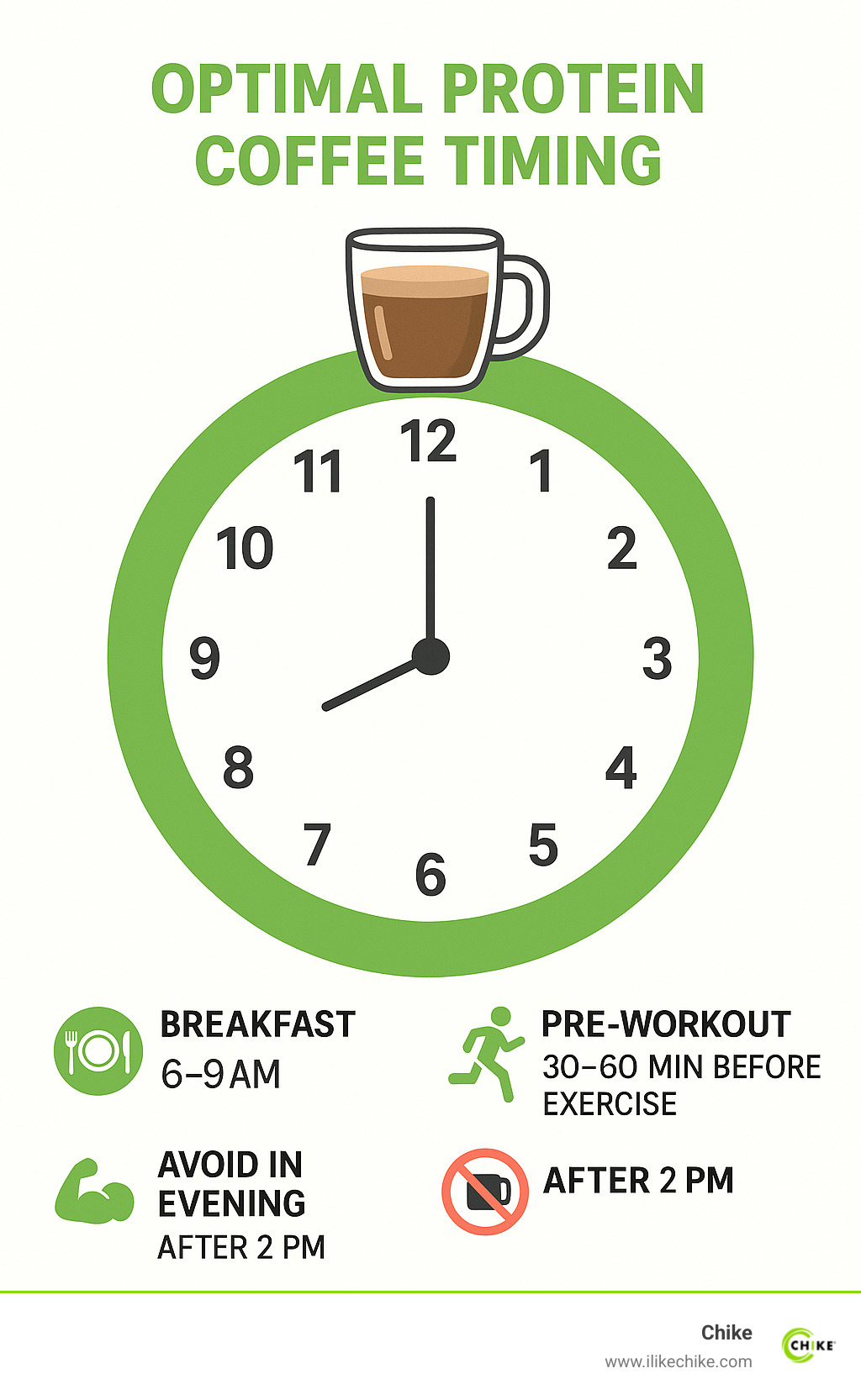
Frequently Asked Questions About Protein Coffee
Does coffee affect protein absorption?
One question I hear all the time is whether your morning brew might be sabotaging your protein intake. Good news, coffee lovers! Current scientific evidence suggests caffeine doesn't negatively affect how your body absorbs protein.
In fact, some research hints that caffeine might actually improve certain metabolic processes related to protein synthesis. Even the mild acidity in your cup of joe doesn't appear to significantly impact protein digestion or how well your body uses that protein.
If you're serious about maximizing your protein absorption (maybe you're an athlete or focused on muscle building), here are a few simple tips:
Look for protein powders specifically designed to mix well with acidic beverages like coffee, stay well-hydrated throughout your day, and try to spread your protein intake evenly across meals rather than loading up at dinner time.
Bottom line? Feel free to enjoy your protein coffee without any worries about compromising your nutrition goals!
Can protein coffee help with weight loss or muscle building?
Protein coffee can absolutely support both weight management and muscle development goals when used strategically.
For weight management, this powerful combo works in several ways. The protein-caffeine duo may give your metabolism a gentle boost, while the protein helps you feel fuller longer, potentially reducing how many calories you consume throughout the day. In fact, studies show that starting your day with a high-protein breakfast (like protein coffee) can reduce your daily calorie intake by nearly 500 calories! Plus, swapping your sugar-laden caramel latte for a protein coffee can dramatically cut your sugar and calorie intake while still satisfying your coffee cravings.
If muscle building is your goal, protein coffee delivers the amino acids necessary for muscle repair and growth. The caffeine might improve your workout performance, letting you train more effectively. It's also an incredibly convenient way to increase your overall protein intake—essential for building muscle—and can be strategically timed around your workouts for the best results.
For either goal, protein coffee works best as part of a comprehensive approach that includes balanced nutrition and regular exercise. It's a tool in your toolkit, not a magic solution!
Are there ready-to-drink options worth it compared to homemade?
The ready-to-drink protein coffee market has exploded in recent years, giving us plenty of grab-and-go options. But are they worth the premium price compared to making your own at home?
Ready-to-drink options shine when it comes to convenience—just grab, shake, and sip. They offer consistent flavor and texture every time, require zero preparation, often stay fresh on your shelf until opened, and provide precise nutritional information right on the label.
Making your own protein coffee at home, however, typically saves you 50-70% per serving (that adds up fast!). You also get complete control over your protein type and amount, ingredients, sweetness level, and flavor intensity. Plus, mixing at home means less packaging waste—a win for your wallet and the planet.
Some high-quality ready-to-drink options, like Chike's High-Protein Iced Coffee, offer an excellent balance of convenience and nutrition. With 20g of protein and just 1g of sugar per serving, plus real espresso for authentic coffee flavor, they're perfect for travel days or hectic mornings when you don't have time to blend.
For everyday consumption, though, making your own protein coffee at home typically makes more financial sense and lets you customize your perfect cup exactly how you like it.
Conclusion
Protein coffee truly represents one of those rare perfect matches—like peanut butter and jelly or salt and caramel—where two great things come together to create something even better. It delivers both the mental lift and simple pleasure of your morning coffee alongside meaningful nutritional benefits that support your active lifestyle.
What makes protein coffee so special is how beautifully simple yet adaptable it is. You don't need fancy equipment or hard-to-find ingredients to create a delicious cup that fits your exact taste preferences and nutritional goals. Whether you're in the mood for something warm and comforting on a chilly morning or a refreshing iced version to power through afternoon workouts, you have endless possibilities to explore.
For those busy days when even the simplest recipe feels like too much effort, Chike's High-Protein Iced Coffee offers a convenient solution with 20g of quality protein and real espresso in each bottle. With just 1g of sugar, it delivers authentic coffee flavor without the sugar crash that comes from typical coffee shop beverages.
As with anything containing caffeine, I do encourage mindful consumption of your protein coffee. Pay attention to how your body responds, keep track of your daily caffeine intake, and time your consumption thoughtfully to avoid those nights staring at the ceiling when you should be sleeping.
I hope you'll take some time to play with different protein sources, coffee varieties, and add-ins to find your perfect protein coffee formula. Maybe you'll find that a splash of vanilla and a dash of cinnamon transforms your morning cup, or perhaps you'll find that collagen protein gives you the silky texture you've been looking for.
Whether you're tracking macros, building muscle, managing your weight, or simply looking to bring more nutrition into your daily routine, protein coffee offers a practical and enjoyable solution that supports your goals while still honoring your love of good coffee.
Here's to better mornings and better nutrition—all in one delicious cup!

 LOVED BY 2,500,000+ CUSTOMERS
LOVED BY 2,500,000+ CUSTOMERS FAST NATIONWIDE SHIPPING
FAST NATIONWIDE SHIPPING SECURE CHECKOUT
SECURE CHECKOUT CLEAN INGREDIENTS
CLEAN INGREDIENTS
 All Posts
All Posts